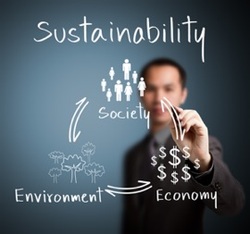Sustainability
|
Navigation
"Any vision of sustainable development fit for the 21st century must recognize that eradicating poverty and achieving social justice is inextricably linked to ensuring ecological stability and renewal" ~'A Safe and Just Space for Humanity', Oxfam |

Sustainability is based on the principle that everything we need for our survival, well-being and prosperity depends either directly or indirectly on the natural environment. It is the capacity for humans and nature to endure and prosper both short- and long-term by building, living, designing, planning and thinking in harmony with nature to ensure a stable, resourceful and prosperous future environmentally, economically and socially. Sustainability, which has been called a "Matter of life and death for people on the planet" by Julia Marton-Lefèvre, Director General, IUCN, is just as much about the economy, personal savings and health, and social equity, ethics and responsibility as it is the environment. Coming in many forms and fashions both large and small, sustainable actions immediately and especially overtime, bring great benefits to people and the planet. Incrementally, our everyday actions might be, or at least appear to be, minor in the grand scheme of things, but combined they add up and connect to either propel us forward towards personal, social, economical and ecological prosperity or drag us backwards towards an inevitable scarcity and degradation of ecological services and functions. From conserving water, to recycling e-waste to shopping organic, you will find a wide variety of actions you may begin taking today or plan over the weekend, such as building a compost, creating a certified wildlife habitat or painting your roof white, which can save you money, help improve your health and certainly allow you to make a difference for wildlife, wild places, your community and the world as a whole. According to the IUCN, Securing the web of life, “A sustainable future cannot be achieved without conserving biological diversity - animal and plant species, their habitats and their genes - not only for nature itself, but also for all 7 billion people who depend on it. The latest IUCN Red List is a clarion call to world leaders gathering in Rio to secure the web of life on this planet.”
"The world’s population of 7 billion is likely to increase to 9 billion by 2050. The demand for diminishing natural resources is growing. Income gaps are widening. Sustainability calls for a decent standard of living for everyone today without compromising the needs of future generations." ~Rio+20 (2012 United Nations Conference on Sustainable Development) 'The future we want'
|
"Rapid and widespread changes in the world’s human population, coupled with unprecedented levels of consumption present profound challenges to human health and wellbeing, and the natural environment.The combination of these factors is likely to have far reaching and long-lasting consequences for our finite planet and will impact on future generations as well as our own. These impacts raise serious concerns and challenge us to consider the relationship between people and the planet. We can choose to rebalance the use of resources to a more egalitarian pattern of consumption... or we can choose to do nothing and to drift into a downward spiral of economic and environmental ills leading to a more unequal and inhospitable future" ~2012 Royal Society report "People and the Planet" "Our old solutions – which address only environmental conservation or short-term human gains – are no longer enough. We need innovative approaches to guide our civilization toward a sustainable future. We must also develop a new ethic and collective purpose, one that recognizes us as stewards of human and planetary well-being. After all, Earth is the only known harbor of life in the universe. And it is home to the only known civilization in the cosmos. Our moral obligation is to support both ourselves and our planet." ~Johnathon Foley, New York Times, 'The Age of Anthropocene: Should We Worry?' |
|
|
"Do what you can, with what you have, where you are." ~Theodore Roosevelt
|
|
Last Revised: 11/20/13
Commenting Rules |








